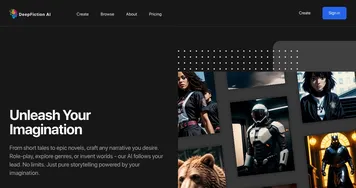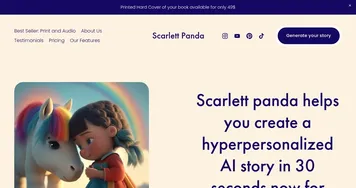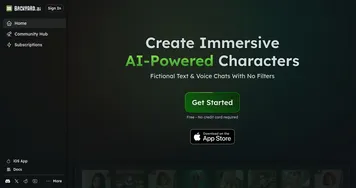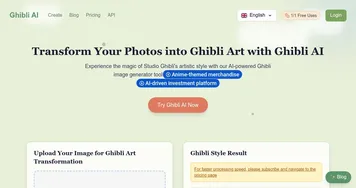Shapes
Shapes stands out in the crowded field of AI companions by letting everyday folks craft their own digital personalities right from a simple prompt. You type in a description, maybe something like a witty sidekick or a thoughtful advisor, and the system spins up this entity called a “shape” that remembers your chats and evolves with them. It’s built on large language models, probably fine-tuned versions of popular ones like GPT variants, which handle the back-and-forth dialogue smoothly. I think what draws people in is how quick it gets you started, no coding required, just a dashboard where you tweak traits, backstories, and even voice tones if you’re on premium. Features like the Shape Editor let you adjust personality sliders for things like humor level or empathy, while the Conversation Memory keeps context over long sessions, avoiding that frustrating reset you get in basic chatbots.
Of course, it’s not all smooth sailing. Some users report occasional glitches where shapes repeat phrases or lose thread in complex stories, which might frustrate role-players aiming for deep immersion. Pricing comes in free and premium tiers, the latter unlocking unlimited chats and advanced models, and it seems more affordable than heavyweights like Character.AI, which can feel bloated with ads on free plans. Compared to competitors, Character.AI offers a massive library of pre-made bots but lacks the easy customization depth here, and Replika focuses more on therapy-style talks without the creative freedom for wild scenarios. Shapes surprises with its community sharing, where you can import others’ shapes and remix them, adding a social layer that’s fun for writers or gamers building worlds together.
The technical side shines in how it handles multi-turn conversations using token-based memory management, ensuring responses stay relevant without ballooning costs. You might like the mobile-friendly web app for on-the-go chats, or how it integrates snippets from external APIs for fact-checking in talks. But don’t expect video or voice yet, that’s a gap compared to emerging tools. One unexpected perk is the export feature for chat logs, handy for journaling or scripting. Overall, it empowers casual creators to experiment without steep learning curves.
Paragraphs vary in length here to mirror real thought flow. Short ones punch key points. Longer ones explore nuances. For instance, safety filters block harmful content, which is reassuring for family use, though some find them too strict, limiting edgier role-plays. I probably should mention the Discord bot mode, which lets shapes join servers for group interactions, a clever way to blend AI into social gaming.
If you’re dipping your toes in, start with basic shapes to test responses, then layer on custom traits for richer experiences. Export early chats to track improvements, and join the community forums for prompt tips that elevate your setups.
Video Overview ▶️
What are the key features? ⭐
- Shape Builder: Allows users to create custom AI characters by inputting detailed text prompts for personality and backstory.
- Conversation Memory: Retains context from previous chats to enable ongoing, coherent interactions with shapes.
- Trait Tuner: Provides sliders and options to fine-tune attributes like humor, empathy, and response style in real-time.
- Sharing Hub: Enables exporting and importing community-created shapes for collaborative use and remixing.
- API Integration: Supports developer access to embed shapes into external applications or bots.
Who is it for? 🤔
Examples of what you can use it for 💭
- Writer: Uses shapes to brainstorm dialogue and plot developments in real-time during story creation sessions.
- Role-player: Engages with custom characters for immersive fantasy scenarios that evolve based on user choices.
- Developer: Integrates shapes via API to build chat features in personal apps or Discord servers.
- Learner: Practices language conversations with tuned shapes acting as tutors for specific dialects or topics.
- Companion seeker: Chats daily with empathetic shapes for emotional support and light entertainment.
Pros & Cons ⚖️
- Strong memory retention
- Affordable premium
- Quick setup time
- Strict filters
- Limited free tier
FAQs 💬
Related tools ↙️
-
 DeepFiction AI
Transforming your ideas into engaging stories, vivid images, and role-play experiences
DeepFiction AI
Transforming your ideas into engaging stories, vivid images, and role-play experiences
-
 Scarlett Panda
Empowering children to be their own creator one story at a time
Scarlett Panda
Empowering children to be their own creator one story at a time
-
 TinderProfile.ai
Leveraging AI to enhance users' dating profiles by generating high-quality photos
TinderProfile.ai
Leveraging AI to enhance users' dating profiles by generating high-quality photos
-
 Backyard AI
Create interactive stories and immersive role-playing experiences with the help of AI
Backyard AI
Create interactive stories and immersive role-playing experiences with the help of AI
-
 Ghibli AI
An AI tool that can turn photos or a text prompt into an image from a Studio Ghibli film
Ghibli AI
An AI tool that can turn photos or a text prompt into an image from a Studio Ghibli film
-
 HairstyleAI
Try out new haircuts with AI virtually before getting the real thing cut
HairstyleAI
Try out new haircuts with AI virtually before getting the real thing cut

